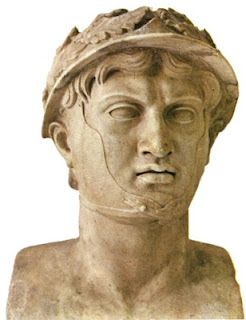He spent most of his childhood as a refugee taking refuge first in the court of the Illyrians after his father was expelled by the Molossians. Pyrrhus however had the good fortune as a young adult to eventually be taken in by Ptolemy and trained and educated by this great ruler.
ON regaining his realm he expanded it to include other parts of North west Greece and defeated the Macedonians in battle and his use of tactics was admired by Greeks and later Romans and Hannibal.
His people called him the eagle but the Eagle must fly and Pyrrhus blocked to ruling Greece and Macedon turned westwards and took sides with the Tarentines against the Romans planning according to Plutarch to conquer first Italy and Sicily and next Northern Africa and use those conquests and resources to gain control over all of Greece and Macedon.
Yes he lost most of his forces to the Romans but the Roman losses were great too and it was six years before he finally abandoned his attempts to conquer Italy and Sicily and returned to Greece.
Want more details? Read Plutarch's Lives!







